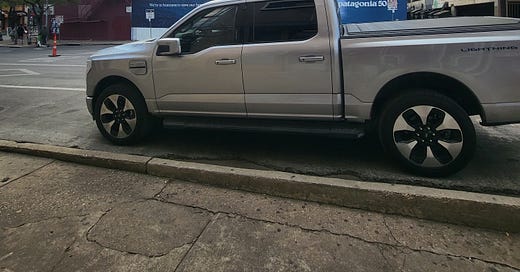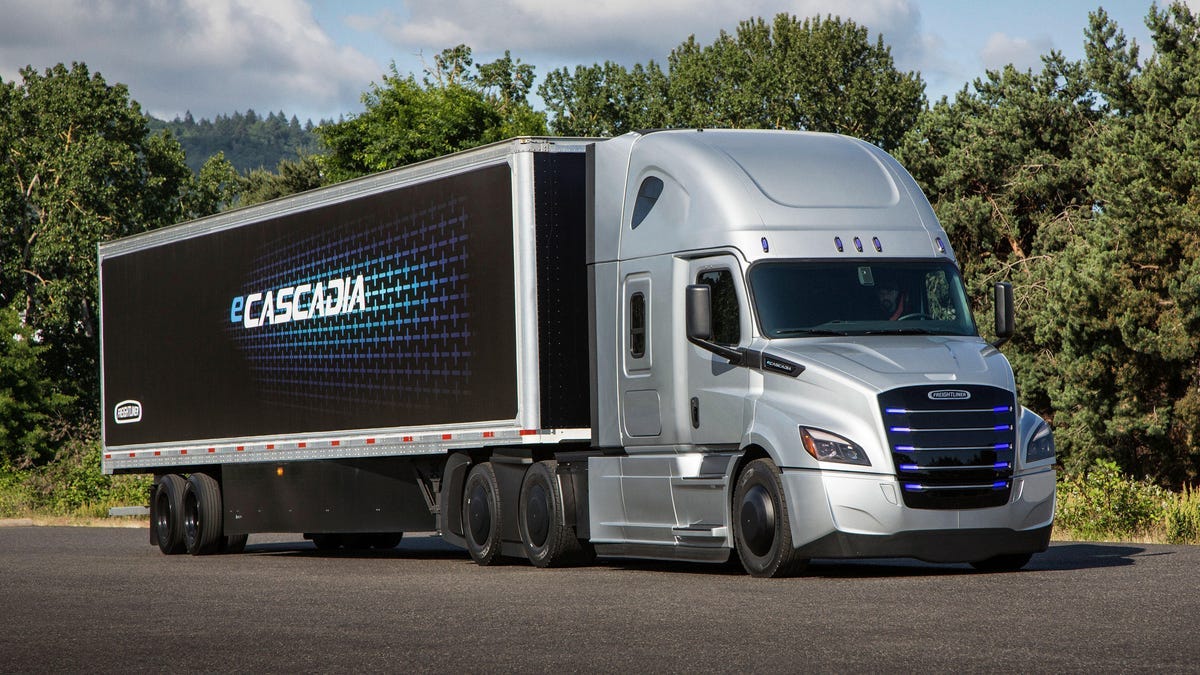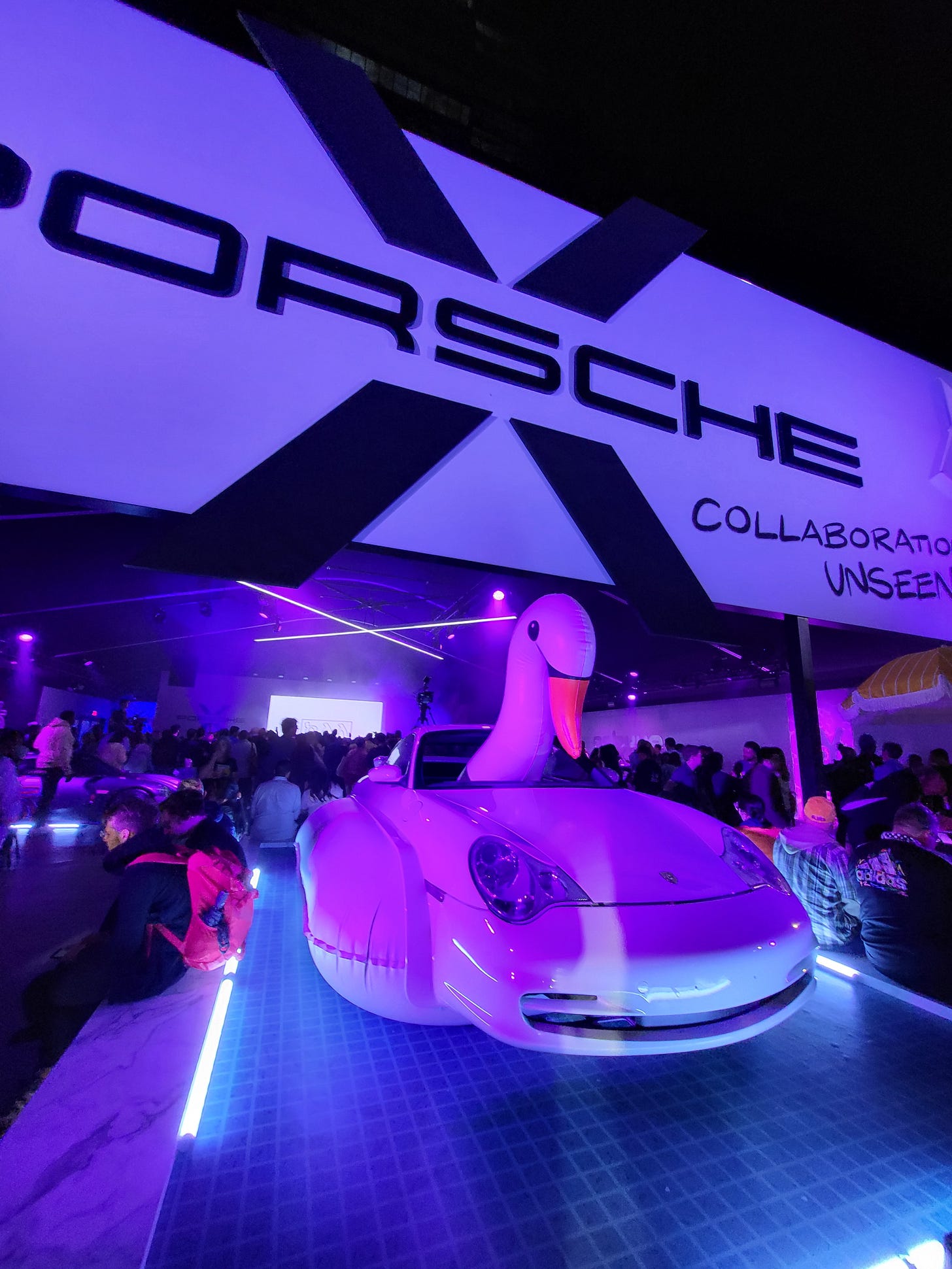"I think this was the coolest thing I saw at South By this year," one dude confided to his fellow dude, as they ambled away from the group of about 30 people milling around the parking lot. It's the kind of thing you hear a lot when you're in Austin during the South By Southwest festival, the main point of which is to amble from one cool, or at least attention-grabbing, activity to the next. But with an embarrassing abundance of comedy shows, concerts, high-profile interviews, and boozy parties, you don't expect people to say it about some German engineers showing off a semi-truck in a barely-signed parking lot.
To be clear, the dudes in question were not necessarily the two that you'd pick out of a lineup as the ultimate arbiters of what is and isn't cool. For the real hard cases reading this, the plural of anecdote is also not data. But the comment stuck with me, not just because I also think the Daimler Trucks eCascadia was one of the coolest things on site, but because it reinforced a feeling that had been nagging me: South By Southwest had changed. The vibes were off.
The last time I'd attended was in 2019, the last hurrah before the pandemic, and it's tempting to think that my memories have been washed out by the rosy glow of The Before Times. But some clear differences can't be so easily explained, like the dramatically dialed-back presence of car and mobility tech companies. Porsche had a big, artsy, lifestyle-y Zoomerbait outpost, but otherwise, mobility nerds like me were forced to catch stray glimpses of the Cruise Origin (mysteriously looking completely different from the vehicle it "debuted" as three years ago) and the eCascadia electric semi-truck in random parking lots food cart pods. The one notable exception was Lightship, a new startup showing off a futuristic electric pop-up camping trailer for hypebeasts looking for the ultimate accessory to their Rivian or Lightning.
But it wasn't just mobility tech: the exuberant clubhouses, "activations," and merch giveaways felt dialed way back from pre-pandemic levels. This was most notable in social media, where Slack was one of the only truly visible brands, maintaining a colorful but low-budget version of the open-bar extravangzas that Twitter and others were throwing just a few years before. Sure, Silicon Valley Bank still had an event on the SXSW schedule as it collapsed into a public bailout, but based on investments made months ago SXSW was going to be a downer anyway.
This might begin to explain how two fairly typical South By Dudes found a semi-truck in a parking lot so interesting. After all, there was no big announcement or anything. It's just an electric semi-truck that's been testing in the hands of fleet customers for two years now, it's being produced right now in Portland, Oregon, and the example The Dudes had just been introduced to was headed to a Daimler Truck dealership elsewhere in Texas, where it was going to serve as a demonstrator for test drives. It's just an electric semi truck.
What makes it impressive, what makes it the kind of thing that South By Dudes find so fascinating about it, is just that it's real. They'd never seen a rendering of it before. They'd never discussed its specs or styling on a forum or social media platform. Nor had they ever really thought about the fact that electrifying a semi-truck that drives 100,000 miles a year will have a vastly bigger environmental impact than their Tesla ever will.
The value of quiet professionalism is rarely appreciated in the midst of a carnival, and for most of the last decade, it's seemed like Mardi Gras would never end. Elsewhere, in the unlistenable influencer-moderated panels where storied automotive brands still flagellate themselves for the sins of not being more of a startup, it almost still feels like you can hear the music. But if you walked Sad By Sadwest with fresh memories of the bottomless optimism of 2019, it couldn't be more obvious that the tunes are fading.
The show will go on. SXSW has already created separate cannabis and psychedelic tracks for its panel and fireside chat programming, and the now-ubiquitous AI hype has stepped up to fill the sucking hole where crypto and Web3 used to be. But there's no mistaking that Big Tech is missing its mojo, and that mojo was a lot of what it brought to the table. Take away that mojo, and people might even cotton on to the fact that the real innovation is being done far from any venture capital money.
Disclosure: Daimler Trucks North America provided me with travel and lodging in Austin, as well as a platinum SXSW pass. If you think that's enough to buy my opinion, keep dreaming. If I'm a homer for these guys, it's because I'm just personally stoked that they are making electric semi trucks in my hometown.









"The value of quiet professionalism is rarely appreciated in the midst of a carnival" - nailed it.
Stock and crypto pumpers were a big part of the ecosystem.